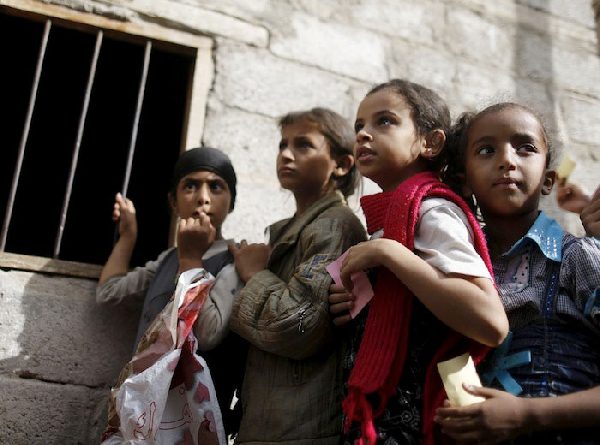
DEARBORN – The humanitarian crisis in Yemen is worsening. The International Red Cross warned of a “real risk” of famine in the war-torn country, as the conflict enters its fourth month. Outbreaks of disease and lack medical supply are also threatening the population.
An alliance of Arab nations led by Saudi Arabia is conducting a bombing campaign in Yemen to halt the advance of Houthi forces, which have taken over most of the country.
The Saudi-led coalition aims to restore the authority of President Abdrabboh Mansur Hadi.
Local Yemeni Americans are worried about the situation in their homeland, regardless of their political leanings.
Ali Baleed Almaklani, the executive director of the Yemen American Benevolent Association (YABA), said the humanitarian situation is “miserable”, especially in the southern part of the county.
He blamed the Houthis for the crisis, saying that the militants and forces loyal to former President Ali Abdullah Saleh have besieged many southern cities and taken over major ports, which prevents aid from reaching the civilian population.
“There is no gas, no electricity, no food,” Almaklani said. “Dengue fever is spreading. Homes have been destroyed, millions of people made refugees.”
He called for an ending “this barbaric war,” urging Houthi forces to withdraw from the southern part of the country.
Activist Walid Fidama also called for a peaceful solution to the conflict, highlighting the tremendous humanitarian cost of the violence.
“There are no roads, no food, no hospitals, nowhere safe,” Fidama echoed Almaklani’s words. “Our homeland is burning.”
However, he said it is futile to blame Yemeni forces fighting on the ground for the humanitarian situation, adding that Saudi Arabia controls Yemen’s airspace, ports and land border.
“Saudi Arabia is besieging the entire country to make the Yemeni people kneel,” he said. “If the Saudis care for the people of Yemen, why don’t they send ships filled with food and medicine?”
Fidama criticized Yemeni Americans who support the Saudi Coalition, saying that it is “shameful” for some Yemenis to call for war in Yemen from the comfort of their air-conditioned homes in the United States.
Fidama said he urges individual efforts to gather donations to help Yemenis because organizations might have a political agenda.
Almaklani said several Yemeni American organizations have created a relief committee that has gathered more than $200,000 in donations.
“The charitable efforts are ongoing,” he said.
Dengue fever spreads
The World Health Organization (WHO) reported last month that there are more than 3,000 cases of dengue fever in Yemen. The United Nations also said in a report last week that an average of 150 new cases of dengue fever and around 11 deaths were being reported daily.
Patients suffering from dengue fever require fluids, monitoring by a physician and hospitalization in severe cases.
According to the Centers for Disease Control and Prevention, dengue fever, which is transmitted by mosquito bites, can be fatal if unrecognized and not properly treated in a timely manner.
U.S. Rep. Debbie Dingell (D-Dearborn) sent a letter to Secretary of State John Kerry Wednesday, requesting information about steps the State Department is taking to combat the deadly outbreak of the fever in Yemen.
“My constituents are reporting that they have family members in Yemen who are suffering from dengue fever and have no access to medication, hospitals, doctors, or in some cases even clean drinking water,” Dingell said. “U.S. leadership is required to contain this outbreak and ensure that patients receive the treatment they need. The people of Yemen need assistance now to combat this deadly disease.”
The congresswoman called for a peaceful end to the war, urging immediate assistance to the war-torn country.
“A negotiated solution to the ongoing conflict is the best way to address this emerging public health crisis in Yemen,” Dingell wrote in her letter to Kerry. “I applaud your efforts in starting a dialogue with the Saudis, the U.N. and other relevant parties to find a peaceful solution to this conflict. However, the people of Yemen need assistance now to combat this outbreak of dengue fever.”
Michigan is home to one of the largest populations of Arab Americans in the country and some 9 percent of the Arab American community in the Detroit and Dearborn area has roots in Yemen, according to Dingell’s office.
In May, the congresswoman introduced an amendment to the National Defense Authorization Act (NDAA), expressing Congress’ non-binding demand that the president should exercise all available powers to evacuate U.S. citizens and nationals in Yemen as soon as possible. She also wrote an earlier letter to Kerry also urging the state department to help Americans in Yemen.
Almaklani thanked Dingell for her efforts.
“We appreciate her concern for all of her constituents and the Yemeni American community.”
Several Arab and Muslim American organizations have filed lawsuits against the federal government for failing to help Americans stuck in Yemen.
The Assignment of Emergency Preparedness Responsibilities executive order requires “planning for the protection, evacuation and repatriation of United States citizens in threatened areas overseas.”






Leave a Reply